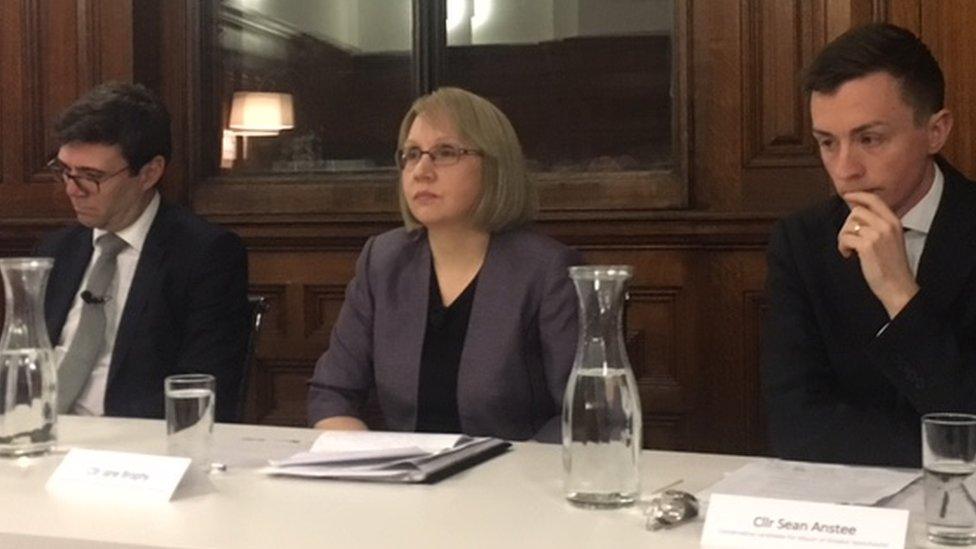Greater Manchester Mayoral Election 2017: How important is NHS to voters?
- Published

Andy Burnham, Jane Brophy and Sean Anstee all dream of becoming mayor
Mancunians will proudly tell you that the National Health Service was born here and indeed it was when the first NHS hospital opened in Trafford in 1948.
Fast forward nearly 70 years, and it's clear from scanning the headlines that health and social care have never mattered more and will feature prominently in the minds of many voters on 4 May when they choose their first mayor for Greater Manchester.
Despite the rumours, he or she will not have control over the region's £6bn budget. But with their electoral mandate the mayor will be an influential figure whose ideas and priorities will hold sway.
Three of the candidates hoping to become mayor were invited to face health professionals at a hustings in Manchester on Thursday night.
'Experience'
The Liberal Democrats' Jane Brophy has worked in and around the NHS for nearly 30 years, and it showed. She spoke with authority about the pressures of shrinking budgets and ever-changing rotas.
What solutions did she offer? Her passion for green issues came across: maximise unused public spaces for physical activities; use tree planting for mental health therapy.
She also pushed her party line on protecting EU NHS workers, asking "where would we be without them?"
After much jargon-filled talk of "bottom-up policy" and "breaking down silos", I asked her about the real issue that could stump her plans - is £6bn enough?
She doesn't think it is and said that, if she is elected, she would battle for more.
'Comprehensive vision'
The Conservatives' Sean Anstee stayed true to his party's philosophy - a healthy economy is the way to a healthy population.
Did he see any issue with private companies increasingly bidding for NHS business? Not if patients felt the benefit.
As leader of Trafford Council he was the only one who could stand up and say: "I have helped bring us this far; trust me to take us further" in relation to devolving more powers to the 10 boroughs.
But when I asked for a solid policy to hang my hat on, he said I'd have to wait for the manifesto.
While his detailed local knowledge and ability to work with Labour colleagues came across, his comprehensive vision for the NHS did not.
'Tangible promises'
Labour's Andy Burnham was on comfy turf. The former health secretary knows the issues, and knows how to pull on Mancunian heart strings.
He quoted Bevan, he referenced Pankhurst, he all but got the red flag out while referencing the region's spirit of radicalism.
While his policies were not particularly radical, they were solid. Full devolution of the Department for Work and Pensions budget, tailor-designed dementia-friendly homes, an integrated cycle system across the conurbation. If he wins these are tangible promises he would certainly have a duty to keep.
As things stand, Mr Burnham is the odds-on bookies' favourite to win.
But the pollsters do get it wrong, and the bookies do sometimes lose money.
There hasn't been a mayoral race in Greater Manchester before and politics is not the game of loyalty it once was.
And, as we learned last year, nobody's vote can be taken for granted any more.
There are four other candidates who have so far declared their intention to stand - as part of our campaign coverage we will be finding out about their policies on health and social care as well as other policy areas.